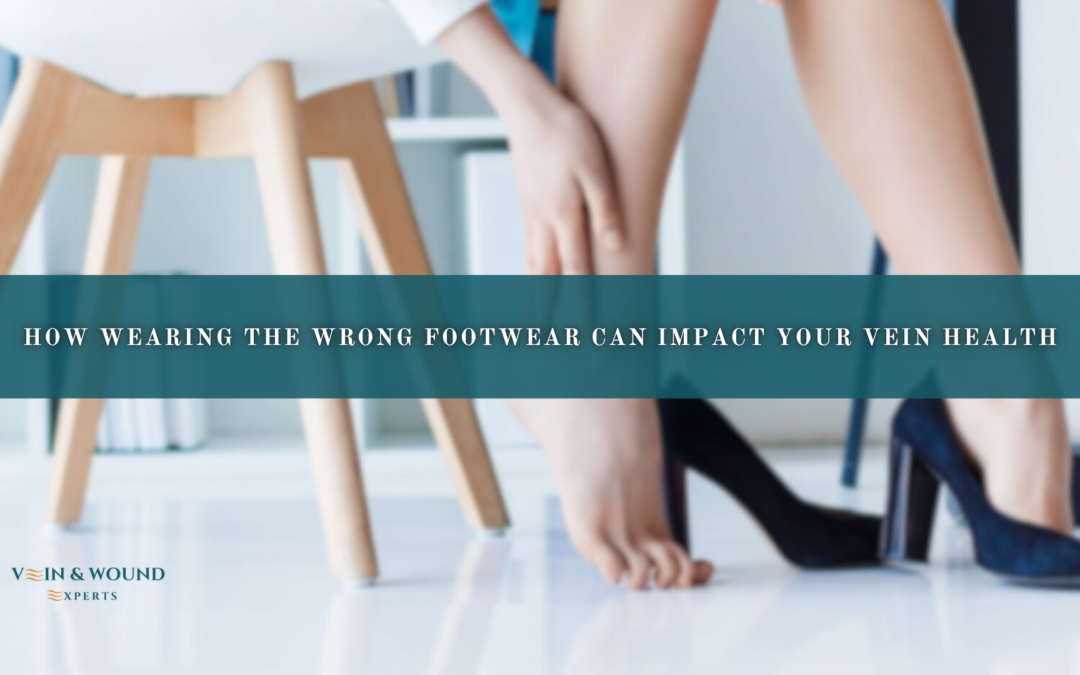Can Footwear Choices Affect Your Veins? 👣
Wearing the right shoes isn’t just about comfort and style – it can also have a significant impact on your vein health. The wrong footwear can contribute to circulation problems, leading to conditions like varicose veins.
The Link Between Footwear and Circulation 🚶♀️
Poor circulation is one of the leading contributors to vein problems, and footwear plays a significant role in this. Wearing shoes that are too tight, too high, or lack proper support can lead to poor circulation and footwear issues. Tight shoes can constrict blood flow, causing blood to pool in the legs and feet, leading to discomfort and, over time, varicose veins. When circulation is compromised, the veins in your legs have to work harder, leading to increased pressure and potential damage. To support healthy veins, it’s essential to wear shoes that promote proper blood flow and provide adequate support.
How High Heels Contribute to Vein Problems 👠
One of the biggest culprits in high heels and vein problems is the pressure they place on the feet and legs. High heels force the body into an unnatural posture, placing more weight on the forefoot and restricting normal circulation. The calf muscles, which help pump blood back up to the heart, are not able to function properly when wearing high heels. This leads to increased pressure in the lower legs, contributing to the development of varicose veins and other circulation-related issues. While high heels may look stylish, frequent use can have long-term consequences for your vein health.
Finding the Best Shoes for Vein Health 👟
If you’re looking to improve circulation and avoid shoes and varicose veins, it’s important to choose footwear that provides support and comfort. Shoes that support vein health should have arch support, a cushioned sole, and a heel height that maintains a natural, neutral foot position. Both overly flat and excessively high shoes can cause circulation problems. Look for footwear with a balanced heel height (typically 1-2 inches) and a wide toe box to let your feet spread comfortably. Additionally, breathable materials can help reduce moisture and enhance comfort.
How Footwear Affects Long-Term Vein Health 🔄
Wearing the wrong shoes daily can lead to chronic vein problems over time. Poor footwear choices can contribute to the development of varicose veins, as they weaken and enlarge the veins. While genetics and lifestyle factors play a role, footwear can either aggravate or alleviate these issues. It’s crucial to pay attention to how your shoes affect your body, particularly if you spend long hours standing or walking. Opting for supportive shoes and making adjustments to your footwear routine can help prevent vein damage and improve circulation.
Footwear Tips for Healthy Legs 👣💪
To maintain vein health and avoid potential problems, consider these helpful footwear tips:
-
Choose shoes with adequate arch support to distribute weight evenly.
-
Avoid wearing high heels for extended periods; alternate with comfortable, supportive shoes.
-
Look for shoes with cushioned soles to reduce pressure on your feet.
-
Give your feet regular breaks by elevating them and stretching throughout the day.
-
Avoid shoes that are too tight or too loose, as both can affect circulation.
-
Consider wearing compression stockings if you’re prone to vein problems or stand for long periods.
Take Action for Healthy Circulation 🏃♀️
The connection between footwear choices and vein health is significant, but it’s something that can be managed with the right footwear and habits. By being mindful of how your shoes affect your circulation, you can prevent issues associated with high heels and promote better leg health. Selecting supportive shoes that encourage proper circulation is essential in maintaining healthy veins and avoiding complications like varicose veins.
Andy Sharify
Position

